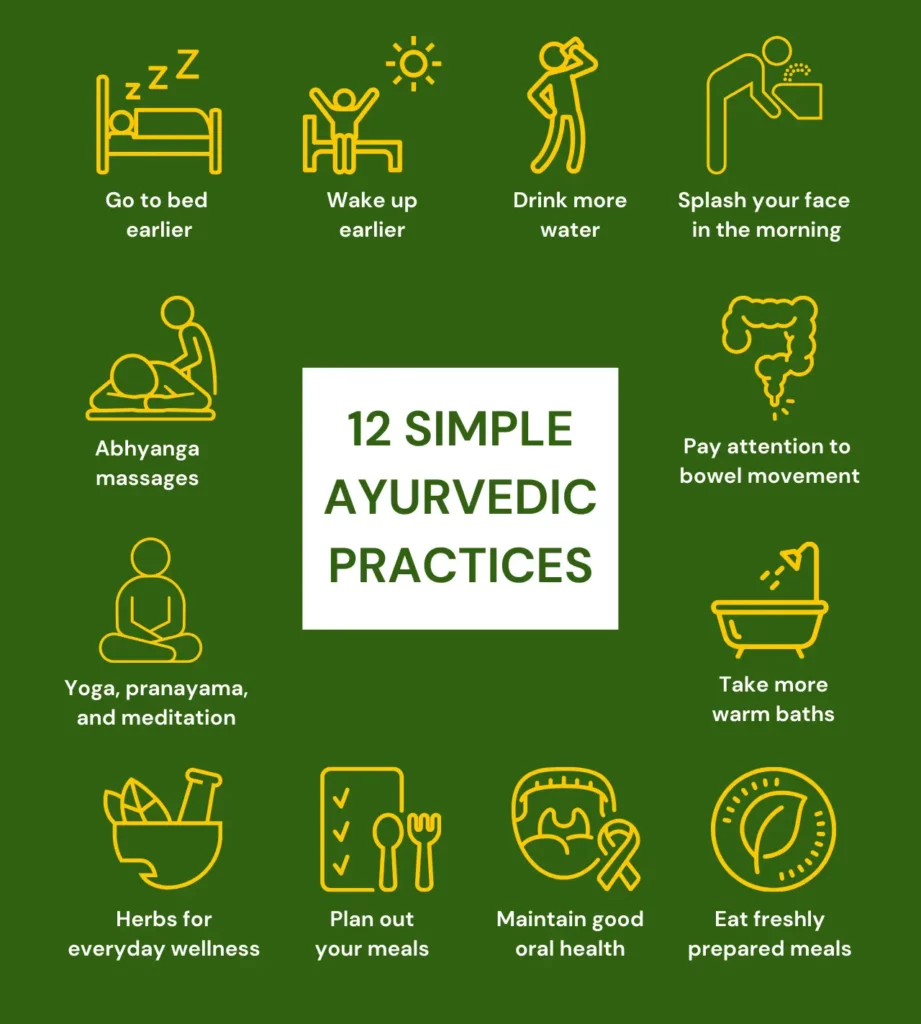Ayurveda is an ancient system of traditional medicine originating from Indian Hindu philosophies. It is one of the world’s oldest and most continuously practiced systems of medicine. The efficacy of Ayurvedic practices lies in their simple and naturopathic techniques that you can easily try at home. Here are 12 simple Ayurvedic practices that can help improve your overall health and well-being.
A Brief Introduction To Ayurveda
Ayurveda comes from the Sanskrit words ayur, meaning life, and veda, meaning knowledge.
Thus, Ayurveda translates to "the knowledge of life".
It is based on three philosophies:
- Vaisheshika: the belief that the four elements (earth, water, air, and fire) make up all physical things.
- Nyaya: a technique of propagating ancient scientific knowledge
- Samkhya: the duality of the body and the eternal spirit
Despite being an ancient system, Ayurveda is still very popular worldwide.
In India, it is considered a separate system of medicine.
Some even treat it as a primary form of healthcare.
In the US, Ayurvedic remedies are used alongside modern medicine.
Benefits Of Ayurvedic Practices
Here are a few possible benefits of Ayurvedic practices:
- May help you fight stress better: The Ayurvedic lifestyle supports a balanced diet and regular exercise to help counter everyday stress. Simple meals and de-stressing exercises like yoga, meditation, and pranayama help keep your mind at ease.
- May promote general well-being: Ashwagandha, a popular Ayurvedic herb, could help ease fatigue, anxiety, and stress. It may also improve sleep and promote mental clarity while having other potential health benefits like improved heart function, sexual function, muscle recovery and strength, and weight management.
- May have a positive effect on the mind and body: Ayurveda promotes nature-based activities like strolling in the park, stargazing, and swimming in natural water bodies. Ayurvedic wellness retreats can better help with mental well-being than a regular vacation.
12 Ayurvedic Practices To Improve Your Overall Wellbeing

1. Go To Bed Earlier
A good night's sleep is essential for overall health.
Ayurveda promotes going to bed early (by 10 p.m.) for restful sleep.
Avoid using phones, tablets, or computers in bed or before you fall asleep.
2. Wake Up Earlier
Waking up early the following day is easier if you go to bed early.
According to Ayurveda, sleeping past sunrise can make you feel lethargic all day.
That's why waking up at dawn with eight hours of sleep is the right way to start the day.
3. Drink More Water
Ayurveda promotes drinking optimal quantities of water to balance your bodily functions.
Drink at least eight glasses of water evenly across your day.
Start your day with a warm glass of water to cleanse your gut for easy bowel movement.
4. Splash Your Face With Water
It's a common practice to start your day by splashing your face with water.
Interestingly, this is one part of an Ayurvedic practice called Shat Kriya, a gauntlet of six cleansing techniques to harmonize your body and soul.
5. Perform Abhyanga
Abhyanga means massaging your body with warm oil.
It can calm the mind and nervous system, tone your muscles, and hydrate the skin.
A 15-20-minute massage with herbal or medicated oil can be very beneficial in the long run.
6. Try Yoga, Pranayama, And Meditation
The correct order is to start with Yoga, then Pranayama (breathing practice), and finish with meditation.
These relaxation techniques help you feel lighter, starting your day without yesterday’s worries.
7. Plan Out Your Meals
Ayurveda recommends three meals a day.
A large, hearty lunch should follow a light, nutritious breakfast.
A simple dinner low in carbohydrates will reduce the load on your digestive system as you wind down for the night.
For a balanced diet, you can follow specific Ayurvedic recipes.
8. Eat Freshly Prepared Food
Ayurveda encourages freshly prepared food over canned, packaged, or processed food.
Season your food with herbs, spices, and condiments to aid digestion.
Avoid drinking water or liquids with your food, as it may interfere with digestion.
9. Pay Attention To Your Bowel Movement
Your bowel movement can indicate the presence of several underlying chronic conditions and give you an idea about your overall health.
According to Ayurveda, hitting the bathroom first thing in the morning is best for your health.
Cleaner bowels promote long-term gut health.
10. Take Care Of Your Oral Health
Good oral health is essential for overall health.
Tongue scrapers, garlic water gargles, herbal toothpaste, and oil pulling are all recommended Ayurvedic techniques for better oral health.
Oil pulling is a mouthwash-like technique that uses an edible oil to cleanse the inside of your mouth.
11. Herbs For Everyday Wellness
Simple, homemade concoctions with Ayurvedic herbs can help remedy some common health conditions.
Drinking hot water mixed with ginger and honey can help overcome a common cold.
Applying cinnamon and clove oil to the forehead can help ease migraine symptoms.
These concoctions are safe and easy to prepare on short notice.
12. Taking A Relaxing Bath
Ayurveda promotes well-being and relaxation through consciously performing everyday practices.
A warm bath can be a great way to unwind after a long day.
It relieves stress, helping you prepare for a good night’s sleep.
Ayurvedic Practices Safety And Side Effects
Ayurvedic diet and lifestyle changes are generally safe, but it’s worth knowing the possible risks of these changes.
The US FDA does not regulate herbal supplements.
Some supplements with Ashwagandha and Triphala may interfere with existing conditions or medications for the same.
Though these supplements are available over the counter, they could be harmful.
Some supplements may contain toxic metals like mercury, lead, and arsenic.
Note: The content of this article is based on currently available information. Consult your healthcare provider before starting, stopping, or continuing any Ayurvedic supplements, treatments, or procedures.
Frequently Asked Questions
What Are The Benefits Of Ayurvedic Remedies?
Ayurvedic remedies are simple. You can easily incorporate them into your daily routine. They can improve your overall health and wellbeing in the long run.
Are Ayurvedic Supplements Safe?
While most Ayurvedic supplements are generally safe, some may interact with existing conditions and adversely affect the body. It's always best to consult your doctor before introducing a new diet or supplements.
Can Ayurvedic Medicines Be An Alternative To Modern Medicine?
While Ayurvedic medications can't replace modern medicines, doctors usually prescribe them alongside allopathic, traditional drugs to improve treatment outcomes.
Summary: Ayurvedic Practices
- Ayurveda is an ancient system of traditional medicine originating from India that uses herbs and medicines made from natural sources to treat diseases.
- In India, Ayurveda is treated like a separate branch of medicine and used as a form of primary healthcare. In contrast, in the US, it is used with modern medication to promote general health and well-being.
- Simple Ayurvedic practices can have long-term benefits for the body. These include going to bed early, eating a balanced diet, and practicing Yoga and meditation.
- These practices can help you fight everyday stress, promote a sense of wellbeing, and improve the quality of life.
Others Are Also Reading

Top 7 Research-backed Ashwagandha Benefits For Men

Is Sleep Meditation For Anxiety Effective?

Top 5 Teas For Better Gut Health In 2024
References
https://www.everydayhealth.com/integrative-health/ayurveda/guide
https://www.liebertpub.com/doi/abs/10.1089/jmf.2022.0042?journalCode=a
https://www.ncbi.nlm.nih.gov/pmc/articles/PMC6492358
https://www.ncbi.nlm.nih.gov/pmc/articles/PMC3931197
https://www.healthline.com/nutrition/ayurvedic-herbs
https://www.webmd.com/balance/what-is-pranayama
https://www.hopkinsmedicine.org/health/wellness-and-prevention/ayurveda




